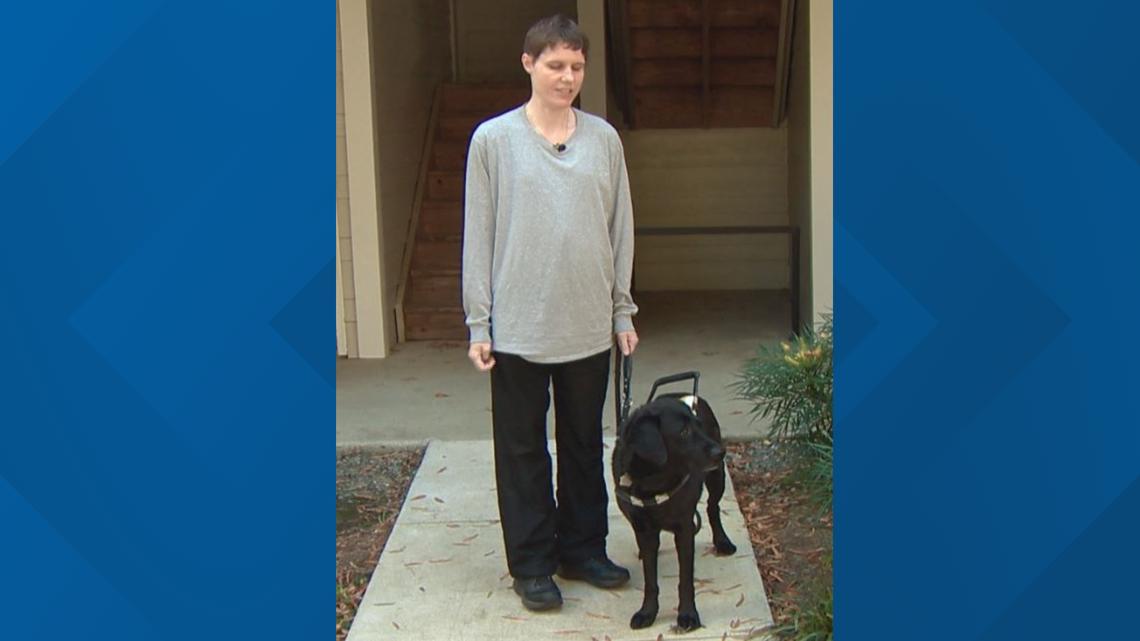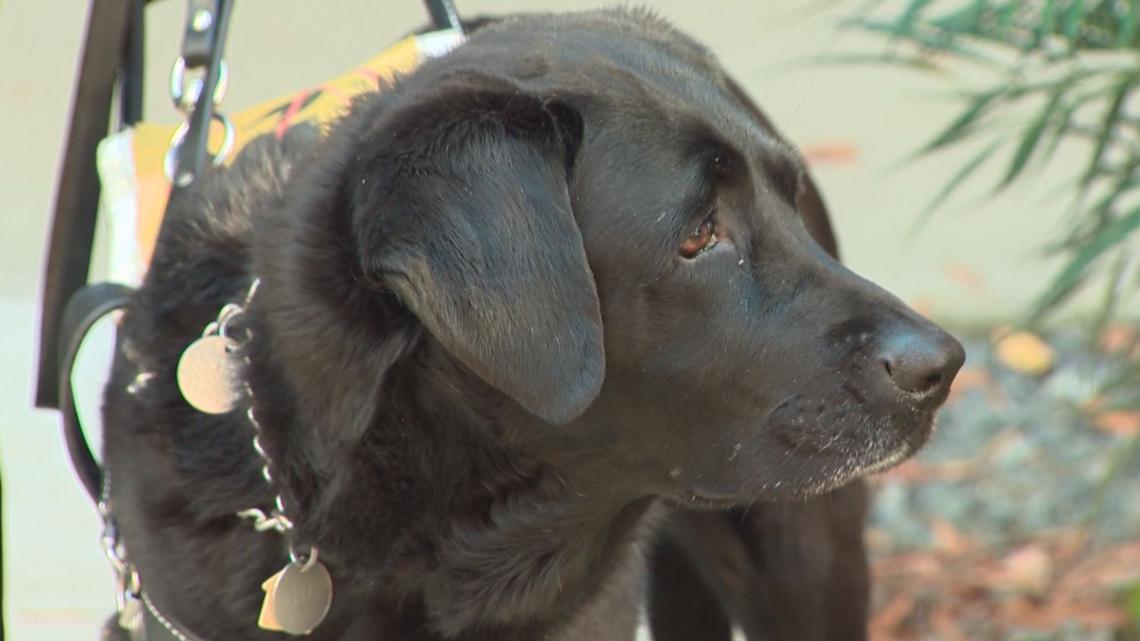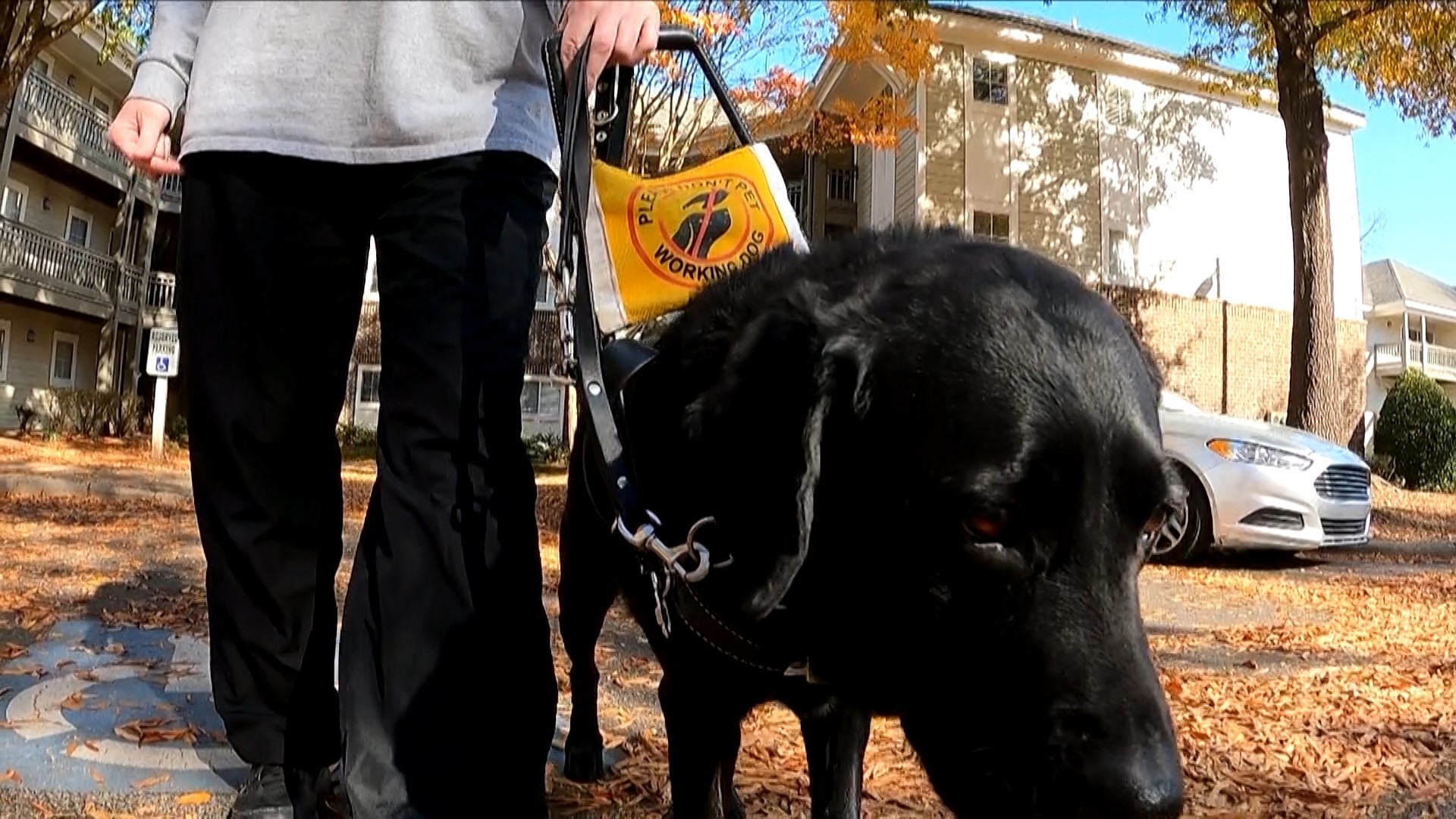CHARLOTTE, N.C. — Jamie Crowell is blind, but she finds, oftentimes, what holds her back are people who can see who are unaware of the discrimination she faces.
"[Blindness] hasn't been a problem for me, except I have problems with other people, sighted people, not knowing what to do," she said.
Jamie Crowell says she has been denied rides because of her service dog
Born without sight, the 41-year-old Charlotte woman relies on her service dog, Carol, to lead the way. More times than she can count, she said others haven't seen the service animal as her legal right.
"I've gotten it so bad recently," Crowell said. "I'm done."
She said Lyft drivers regularly deny her a ride because of her guide dog, which is not only a violation of the company's policy but a violation of the law.
"I walked out one day to go to the store, and this guy starts yelling at me, 'No dogs! No dogs! ... I won't let you bring a dog into my car,' and he locked the door," she recalled.
She said her most recent, negative Lyft encounter took place outside a Charlotte PetSmart.
"Oh, I was mad," Crowell admitted. "This lady pulls up and she says, 'I don't do animals,' and in my head, I'm like, 'Well, you did come to PetSmart. What did you expect?' The whole time she kept saying, 'I'm allergic to dogs.' Well, that's not an excuse."


Lyft's policy on service animals
Below is an embedded YouTube video from Lyft which explains the company's policy regarding service dogs.
Lyft's service animal policy reminds drivers to "Always say yes," but Crowell's experience suggests that message isn't reaching every driver.
Crowell said Lyft drivers have illegally denied her a ride "too many [times] to count."
"The crime is discrimination," she said. "To me, it's social injustice. You deny a ride from me one more time, and you're going to wish you hadn't."
History of problems with Lyft and Uber
Crowell's problem is not new. Both Lyft and Uber entered into settlement agreements with the National Federation of the Blind nearly five years ago. The companies promised to improve training and terminate drivers who knowingly or repeatedly deny rides.
However, the most recent data published in 2020 by NFB, show discrimination persists with Lyft drivers denying 25% of test rides in cities across the country. A Lyft report identified 119 denials due to a service animal during a series of 476 test rides between March 1, 2019, and February 29, 2020.


"You never know when you order one of these vehicles when you're going to [actually] get a ride," NFB Public Relations Director Chris Danielsen said. "It just hurts to be discriminated against."
Danielsen said the NFB prefers to resolve ongoing discrimination through collaboration with ride-share companies but said the organization "will explore other options" if needed.
"Uber and Lyft have really transformed the transportation landscape for blind people as they have for many other people. They're such a quick and convenient means of transportation and it's really liberated a lot of blind people, but, of course, that liberation doesn't happen when we're denied rides," Danielsen said. "It's unlawful."
Access to transportation for all is equitable
American Foundation for the Blind Public Policy and Research Senior Advisor Sarah Malaier cited research that shows inconsistent access to transportation negatively impacts people who are blind and with low vision.
"It impacts your ability to get or retain a job, to access health care, and to be active in your community," Malaier said. "It's really important to us that people have access to ride-sharing services when they want to use them and equitably just like any other person who would schedule a ride-share."
Knowing ride-share transportation is only convenient when it's consistent, Malaier said continuing education is critical.
"Even when companies recognize they have an obligation, they don't always do a good job of educating employees," she said. "We're starting to see progress, but there's certainly a lot more that needs to be done."
These are the consequences for discrimination
Denied and forced to request another ride all too often, Crowell is not left with much confidence in the systems that have failed her.
"Not enough has been done," Crowell said after his difficulties trying to access rides in Charlotte.
She wants stiffer consequences. Her most recent complaint resulted in Lyft re-educating the driver. The company said they warned the driver that another violation would lead to deactivation. Lyft also credited Crowell's account $5 for her bad experience.
"They give you the same old response," Crowell said.
In Crowell's eyes, it's more than an inconvenience. It's a crime.
According to Disability Rights North Carolina, police can cite a driver with a misdemeanor for denying a ride.
"You can ask for a law enforcement official or magistrate to issue a criminal summons against a person or business owner who is refusing you access because of your service animal," the organization explains in its self-advocacy packet. "The maximum fine that can be imposed for a Class 3 misdemeanor is a $200 penalty, plus the costs of court. Other forms of restitution could include alternate dispute resolutions, like ADA training or unsupervised probation."
According to NFB, this is also against the law in South Carolina.
What Lyft says they have done in response to the complaints
In response to WCNC Charlotte's questions, Lyft reaffirmed the company's commitment to maintaining an inclusive and welcoming community. Lyft said the company investigated every one of Crowell's complaints and took action with the drivers involved. In most cases, they suspended those drivers and issued final warnings.
"Lyft has a strict Service Animal policy that requires all drivers to accommodate passengers traveling with service animals, and we take any allegation of this nature very seriously," a Lyft spokesperson said. "There is no place for any form of discrimination on our platform."


How Crowell typically gets around
Crowell knows she is not alone.
"I am not the only one," she said. "I have a friend who lives across town who faces this and I think, at some point, has faced it more than I have."
Crowell said she primarily uses a taxi cab, paid for by social services, to get to and from her full-time job, but the rest of the time, she relies on Lyft. She said the recurring denials are not only infuriating, but they're also interfering with her quality of life.
WCNC Charlotte connected Crowell to the NFB to possibly be a resource for her going forward.

